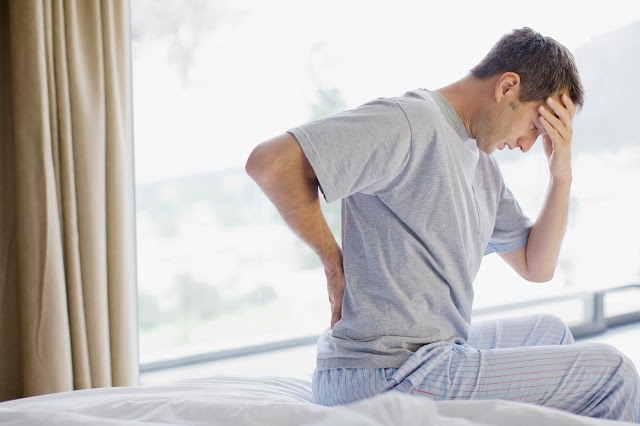Yes, exercise can help you lose weight, but you’ll be surprised at how many other ways it can radically improve your health and well-being.
You're suddenly experiencing pain
We’ve all had one of those mornings—you wake up and your lower back, knee, or shoulder is suddenly aching. But while you might be tempted to wait it out, certified personal trainers Jim Karas and Michelle Blakely suggest getting your body in motion. Just moving your muscles, loosening your joints, and getting blood pumping to that area of your body can be enough to lessen the pain, Karas says. Even clients who have faced longer-term pain, like that which comes with rheumatoid arthritis, have improved their daily movement and ability to do chores by getting regular exercise. After your workout, chow down on one of these foods that fight pain naturally.
You're constantly fatigued
If you’re tired all the time, even with adequate food and sleep, maybe all you need is to move a bit more. It may seem a bit counterintuitive, but a study from the University of Georgia showed that just 20 minutes of moderate-intensity aerobic exercise three times a week increased energy levels by 20 percent. Researchers said the findings showed how exercise directly acts on the central nervous system to decrease fatigue, in some cases as much as 65 percent, according to the New York Times. “I like to tell my clients that an object in motion stays in motion,” says Chicago-based personal trainer Traci Mitchell. “It’s kind of like getting that big boulder of motivation moving, and once it gets moving, your energy increases.” Here are more tricks to beat fatigue naturally.
You're stressed
“Stress levels have never been higher,” Karas says, and statistically, he is right. Researchers at Carnegie Mellon University showed that stress increased 18 percent for women and 24 percent for men from 1983 to 2009. We’re more worried about finances, constantly bombarded by media and information, and too busy to decompress—and that stress could be making us sick. But just walking, running, or strengthening your body for 20 to 30 minutes three to four times a week is enough to significantly decrease your anxiety, and research shows that adding in music makes that exercise even more effective in fighting stress. “If you’re dealing with a difficult decision, probably one of the best things you can do, whether it’s personal or business, is to get out and put your ear buds on,” Karas says.
Your hormones could use some TLC
Exercise is an excellent way to help regulate your hormones, and you’d be surprised at how much that can impact how you think, look, and feel. For example, boosting your testosterone levels, which can be done through exercise, helps increase your metabolism, maintains youthful-looking skin, and keeps your brain functioning properly, according to Karas.
Your digestion is out of whack
A 30-minute run or brisk walk will do more than just increase your appetite for dinner; it will help you digest your dinner, too. Aerobic exercise quickens your breathing and heart rate, which in turn improves the contraction of your intestinal muscles. As a result, your digested food passes more quickly through your intestines and out of your body, decreasing constipation. Moving in whatever method (walking, running, swimming, dancing, and even stretching or yoga) will help with digestion. Enhance the healthy belly benefits your workout by adding foods that boost good gut bacteria to your diet.
Your time-management tricks are failing you
Personal trainer April Sutton says a lot of her clients approach her for assistance when they feel like they’ve lost control over how they structure their time due to overwhelming work and family commitments. “They can’t really think for themselves outside of their jobs because they’re so burnt out,” says Sutton. Trainer Michael Moody has clients prioritize exercise, and think about how other habits (how they eat, sleep, and how much they sit at work) can impact how they feel when they exercise. Becoming “human scientists of their body” helps people better understand how their lifestyles can impact their health, Moody says. From there, it’s a matter of correcting bad habits, and continuing to put aside time to exercise regularly. Besides exercise, successful people do these things after work.
You're not sleeping well
If you’re having trouble nodding off or staying asleep at night, you may need to move a bit more during the day. In a study published in the journal Sleep Medicine, researchers at Northwestern University found that insomniac middle-aged and older participants who exercised and were taught to sleep in a cool, dark room and go to bed at the same time each night got 1.25 more hours of sleep nightly than those who did not participate in physical activity. Whether you have chronic insomnia or you just haven’t been sleeping well lately, getting some aerobic activity in during the day will probably help you catch more Z’s at night. Here are some signs you're not sleeping deeply enough.







